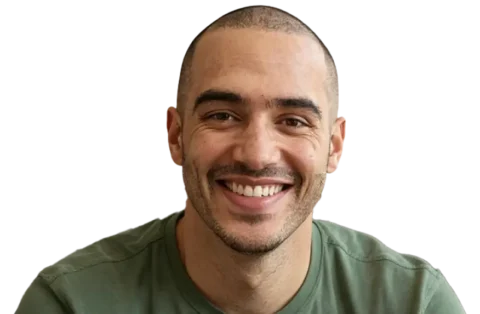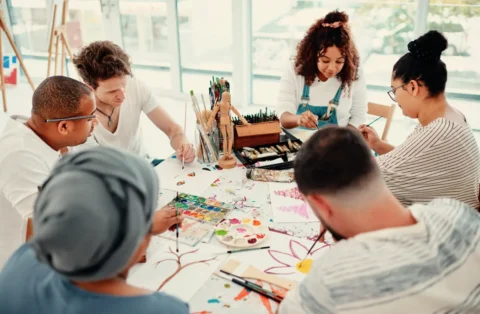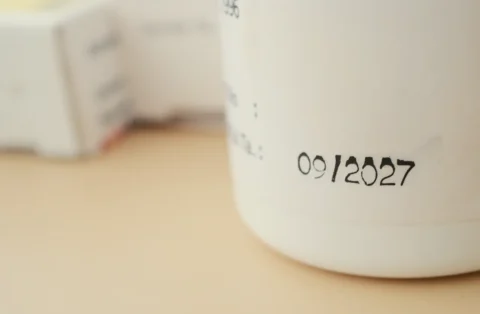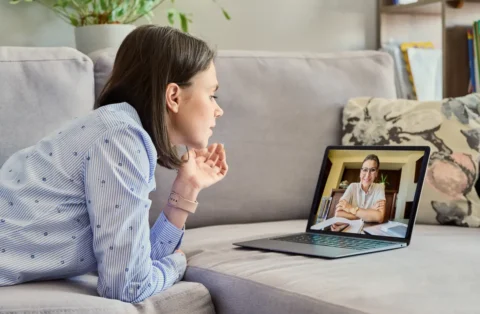What you’ll learn
This article explains how to support a loved one through addiction recovery without enabling harmful behavior. You’ll learn the difference between helping and enabling, how to set healthy boundaries, and practical ways to stay involved while protecting your own well-being.
When someone you care about is going through addiction, it’s natural to want to help. Most people in this position do their best with what they know: offering support, stepping in when things go wrong, trying to keep the situation from getting worse.
But support is rarely straightforward. Sometimes, what brings comfort in the moment might not support long-term healing in the way we hope. And sometimes, without realizing it, support can unintentionally shift into enabling, where loving efforts remove challenges that might otherwise inspire change.
This doesn’t mean families are doing something wrong. It means addiction is complex, and the line between helping and enabling isn’t always clear.
This article offers guidance for loved ones, while our companion piece helps individuals in recovery learn how to talk to their families with honesty and care. Both perspectives can open the door to more understanding and shared healing.
We’ll walk through what effective family support looks like, how to recognize enabling behaviors, and how to stay involved in a way that supports recovery without compromising your own health or boundaries.
Being part of someone’s support system can make a real difference, but only when that support is steady, informed, and rooted in respect for both your loved one and yourself.
Need support navigating recovery as a family? Talk to a licensed provider at QuickMD to get expert guidance that respects both your loved one’s journey and your own boundaries.
Helping vs. enabling: understanding the difference
When someone in your life is struggling with addiction, stepping in feels like the right thing to do.
You may offer money, make excuses to protect them from consequences, or take over responsibilities they’ve dropped. These choices usually come from love, even if they’re made in moments of worry or uncertainty.
But over time, they may unintentionally make it harder for them to recognize when they need support.
Helping vs. enabling
Helping supports someone’s well-being and encourages healthy choices. It respects their autonomy while offering care, structure, and accountability.
Enabling, on the other hand, removes discomfort or shields someone from the natural outcomes of their behavior. It may feel compassionate in the moment, but it can unintentionally delay change.
Here are a few examples of the difference:
| Situation | Helping | Enabling |
| Missed a bill due to drug use | Helping them set up a budget or connect with a counselor | Paying the bill quietly so they don’t experience the consequence |
| They say they want treatment | Offering to help them find a provider, drive them to an appointment, or support their recovery goals | Letting them postpone treatment “just until next month” without checking in again |
| Substance use in your home | Communicating clear, respectful boundaries | Staying silent to avoid conflict or out of fear that they’ll leave |
The goal isn’t to be perfect, it’s to stay aware. Understanding the difference between helping and enabling gives your loved one the best chance at recovery. Plus, you protect your own mental and emotional health along the way.
What supportive involvement really looks like for addiction
You don’t have to have all the answers, and you don’t have to step away completely either. The most helpful support lives somewhere in between: steady, honest, and grounded in respect.
It often starts with simply being present and listening without fixing or interrupting. For someone in recovery, that kind of calm presence can be more powerful than any advice.
Support can be practical, too. Helping find a treatment provider. Offering a ride. Watching their kids during therapy. These small things ease the process without taking it over.
But involvement also means setting boundaries. Saying, “I won’t give you money,” or “You can’t use in my home,” isn’t rejection, it’s care. It shows respect for both your needs and theirs.
What matters most is consistency. Not intensity. Not heroics. Just showing up in a way that’s calm, clear, and sustainable. That’s often the most loving thing you can do.
Tip: using respectful, non-stigmatizing language
Words matter, too, especially when it comes to addiction.
According to the National Institute on Drug Abuse (NIDA), addiction should be recognized and spoken about as a treatable medical condition, not a personal or moral failure. This shift in language helps reduce shame and makes it easier for people to seek support.
Using terms like “person with a substance use disorder” instead of “addict” or “in recovery” instead of “clean” helps preserve dignity.
For families, adjusting language can be one of the simplest yet most powerful ways to support a loved one’s healing.
Signs you may be enabling without realizing it
It’s natural to want to help. But when someone you love is struggling with addiction, the line between support and enabling can blur pretty quickly, and you might not even see it happening.
Maybe you’ve called their boss to explain a missed shift or quietly covered their rent after they spent money on drugs. You might avoid bringing up your concerns to keep the peace, or say yes to things that leave you feeling drained, just to avoid tension or protect the relationship.
These actions often come from love. But they can also protect the behavior instead of encouraging change.
Another sign? If you find yourself constantly managing their care while feeling emotionally exhausted, it might be time to reassess the dynamic and ensure your role is sustainable. You can help and maintain boundaries. Especially if your own needs (mental, emotional, even financial) have taken a backseat in the process.
This isn’t about blame. It’s about noticing when your role is no longer sustainable. Small shifts can change the dynamic: more boundaries, less rescuing. More room for accountability, without losing compassion.
If you’re wondering how to make those small shifts (or how to support someone without losing your footing), there are frameworks that can help. One evidence-based approach for families is the CRAFT model.
A closer look at the CRAFT model
The CRAFT approach (short for Community Reinforcement and Family Training) offers families a practical way to support a loved one through addiction, without confrontation or waiting for things to get worse.
It focuses on improving communication, setting compassionate boundaries, and reinforcing small steps toward change.
How the CRAFT model works
- Encourages positive communication: Families learn how to speak with empathy and clarity to reduce conflict and build trust.
- Uses rewards to reinforce healthy behavior: Small steps toward recovery (like keeping appointments or showing openness) are met with connection and encouragement.
- Promotes stepping back from harmful patterns: Instead of reacting to substance use, families are taught to gently disengage and avoid enabling.
- Emphasizes healthy boundaries and self-care: CRAFT helps families protect their emotional well-being while staying lovingly involved.
- Builds motivation through environment: By shifting the home environment to favor recovery, families can help increase their loved one’s readiness for change.
The idea is simple: over time, the environment we create can help shift someone’s motivation. Families can support recovery in a way that encourages without losing themselves along the way.
Putting methods like this into practice day by day is where real change happens. Let’s take a closer look at how to support recovery in a way that’s truly helpful, without crossing into enabling.
How to support recovery without enabling
Supporting someone in recovery doesn’t mean fixing their problems or protecting them from the consequences of their choices. It means showing up with care, honesty, and consistency in a way that supports growth, not dependency.
Sometimes that means setting clear boundaries. You might say, “I support your recovery, but I won’t give you money,” or let them know your home has to remain substance-free.
These aren’t ultimatums: they’re limits that protect both of you, and they help keep the relationship grounded in mutual respect.
It also means encouraging accountability. When someone breaks a promise or misses an appointment, it’s tempting to smooth things over. But shielding someone from the results of their choices can unintentionally slow progress. Instead of stepping in, you might simply ask, “What’s your next step?” Let them lead and walk beside them, not ahead.
You don’t need to control their recovery. In fact, trying to manage every detail can create more stress for both of you. Your role is to be present, not perfect. Consistent support gives them room to find their footing.
And while you’re offering that support, take care of yourself too. Recovery affects everyone involved. Support groups or therapy can help you stay centered so you’re not running on empty. Because your stability matters, and it makes your support more sustainable.
Progress doesn’t have to be dramatic. Small steps still matter. Acknowledging the effort, even in small ways, helps keep recovery moving forward.
Why boundaries are an act of care
It’s easy to fear that setting boundaries might be seen as giving up. But the truth is, healthy limits are often the opposite of abandonment; they’re how you stay connected without being consumed.
When someone you love is in recovery, it’s tempting to say yes to everything just to avoid conflict. But that often leads to resentment, confusion, and burnout. Boundaries provide clarity. They let both of you know where you stand. And in that clarity, trust has room to grow.
You matter in this, too. If you’re constantly pushing past your own limits to keep them comfortable: saying nothing when they use in your home, or covering for them when they miss work, eventually, something gives.
Protecting your mental and emotional health isn’t selfish. It’s essential. You’re not alone in this. Addiction often affects the entire family, not just the person struggling, and it’s okay to take a step back to care for your own health, too.
Saying no isn’t about rejecting or punishing anyone. It means giving them the opportunity to take ownership of their choices. And it sends a deeper message that often gets missed: I believe in you. I believe you’re capable of doing the hard work, and I’m not going to take that opportunity away from you.
Families facing addiction often ask, “Am I doing the right thing?” One Reddit user shared a story that reflects how difficult (but necessary) those first boundaries can be.
Real experiences with setting boundaries for addiction
Setting a boundary with someone you love isn’t easy, especially when it’s your sibling.
One Reddit user shared a story about their boyfriend, who decided not to visit home while his brother was actively using. It was the first time anyone in the family had drawn a line like that, and it wasn’t well received.
The parents pushed back, insisting that ‘love meant showing up no matter what’. But the boyfriend stayed firm, gently explaining that he still cared, but couldn’t be present under those circumstances.
In the thread, others chimed in with their own stories and encouragement.
People in recovery will tell you themselves that healthy boundaries set by loved ones are often part of the reason they seek help.
Others echoed how hard it can be to set limits, especially when families enable the behavior. Some users shared going low or no-contact, not out of punishment, but to protect their own emotional well-being.
These stories remind us that boundaries aren’t walls. They’re lines drawn with care and intention, even when they’re misunderstood at first. It’s okay to need to distance yourself. And it’s okay if not everyone understands your choices right away.
What matters is that you’re acting out of love, for your sibling, yes, but also for yourself. Not every situation calls for the same kind of boundary. What works for one family may look different for another, and that’s okay.
Boundaries as a foundation for recovery
In recovery communities, structure and boundaries create a sense of safety, responsibility, and trust.
The National Alliance for Recovery Residences (NARR) emphasizes that supportive housing environments rely on clear expectations to help people rebuild their lives, not just through sobriety, but through stability and connection.
Families can mirror this same approach at home. When boundaries are consistent and respectful, they help make relationships feel safer for everyone involved.
What healthy boundaries do in recovery
| Boundary purpose | What it looks like |
| Protect your well-being | Saying no to behaviors that cause emotional or physical harm |
| Maintain clarity in the relationship | Defining what is and isn’t okay in your home or life |
| Encourage accountability | Letting your loved one experience the consequences of their actions |
| Support mutual respect | Creating an environment where both people’s needs are acknowledged |
| Reinforce trust over time | Being consistent with what you say and what you allow |
Boundaries aren’t about control. They’re about love with direction. And sometimes, that’s exactly what recovery needs most.
When support becomes enabling
Saying yes to everything doesn’t always mean you’re being supportive. Sometimes, the very things you do to protect someone, covering for them, avoiding hard conversations, and keeping the peace, can actually hold them back. That’s often what people mean when they talk about enabling, but they don’t always realize it in the moment.
It almost always starts with love. You want to ease their discomfort, to keep the situation from getting worse. So maybe you pay the fine, call in sick for them, and smooth over the argument. But each time you shield them from the consequences of their choices, you make it a little easier for the cycle to continue.
And often, you’re not just protecting them; you’re protecting the fragile calm of your relationship. There might be tension, or maybe everyone’s walking on eggshells. So, you stop bringing things up. You stay quiet, hoping the problem will pass. But silence isn’t the same as support. It’s often what keeps both of you stuck.
If you feel overwhelmed or emotionally stretched (and still keep going out of habit or concern), it may be time to ask: Is my support helping them grow, or am I stepping in to keep things from feeling uncertain?
Recognizing that shift isn’t failure. It’s clarity. And it’s the first step toward creating a healthier dynamic that leaves room for honesty, growth, and real recovery.
How QuickMD helps families support recovery without overstepping
When a loved one starts treatment, especially with medication like Suboxone, it’s natural to want to help. But striking the right balance, like being involved without taking over, can be tricky.
At QuickMD, we specialize in Medication-Assisted Treatment (MAT) for opioid use disorder. Our providers use medications like Suboxone (buprenorphine/naloxone) to help reduce cravings, ease withdrawal symptoms, and support long-term recovery.
For many, this approach creates stability, making it easier to engage in therapy, rebuild routines, and stay connected with loved ones.
Here’s how we make support easier for families:
- Respect for privacy. All appointments are private and patient-led. That means your loved one stays in control of their care, and you’re only looped in if they want you to be. This builds trust and encourages autonomy.
- Accessible care from home. Because we offer virtual visits, your loved one can stay consistent with treatment, without needing rides, rearranging work schedules, or navigating complicated logistics. Your support can be practical, not overbearing.
- Optional involvement. If your loved one is open to it, they can choose to involve you in parts of their care. Maybe you can help keep track of appointment reminders or join a check-in call. But it’s always their choice.
- Education and resources. Families often have questions about Suboxone, relapse risk, or how to navigate difficult moments. Our providers can point your loved one (and you, if invited) toward credible resources to learn more; no guesswork or misinformation.
Our approach respects that every recovery is different. Some people want to share each step, while others need space to find their own rhythm.
If you’re not sure where to start, a conversation with a QuickMD provider can help clarify your role and offer guidance that fits your situation.
Either way, we support the path forward: with real treatment, professional care, and room for family to show up in a healthy, supportive way.
Finding support: resources for you and your family
You don’t have to do this alone. Whether you’re looking for information, emotional support, or practical tools, trusted resources are available for individuals in recovery and those who care about them.
- SAMHSA’s National Helpline offers free, confidential support 24/7. You can call 1-800-662-HELP (4357) to connect to treatment options and community resources near you. (SAMHSA)
- Nar-Anon Family Groups provide support for friends and family members of people affected by addiction. In-person and online meetings offer a space to share experiences and find strength through connection. (Nar-Anon)
- Reddit’s r/naranon is an active online community where people offer each other support, advice, and encouragement. It can be a helpful place to connect, especially if you’re not ready to talk in person. (r/naranon)
- QuickMD also offers confidential counseling services. This is where family members can speak with licensed providers to better understand medication-assisted treatment (like Suboxone), what recovery looks like, and how to support it in a healthy, non-intrusive way.
Support for yourself is part of supporting your loved one. Reaching out, asking questions, and finding community are meaningful steps, no matter where you are in the process.
Final thoughts: support without control
Supporting someone in addiction recovery is about showing up in a way that respects their path and their pace. It means offering encouragement without pressure, being present without pushing, and trusting that real progress takes time.
If you’re a loved one trying to help, remember this: your care matters. But so does their autonomy.
QuickMD provides a way to access treatment that centers the patient, offering privacy, flexibility, and real medical support. When your loved one is ready, they can begin recovery from home with Suboxone treatment and compassionate providers who understand the process.
And if you’re the one in recovery, know this: you don’t have to choose between independence and support. Healing is possible with the right tools and a community that respects your boundaries.
Frequently asked questions about helping without enabling
What if my loved one doesn’t want help right now?
It’s tough to watch someone struggle and not step in. But recovery is most effective when the person is ready to engage. You can still offer support by staying present, setting healthy boundaries, and reminding them that you’ll be there when they’re ready.
What should I do if my loved one relapses during recovery?
Relapse can feel like a step backward, but it’s often part of the process. It’s not a sign that recovery is over, but that something may need to shift. Focus on encouraging your loved one to reconnect with their provider or support system. Remind them that it’s okay to need help again. For you, this might also be a time to check in on your own boundaries and support network.
How do I help someone with addiction if we live far apart?
Regular check-ins via phone, text, or video call can go a long way in helping your loved one feel connected. If they’re open to it, you might also help them research providers, help locate support groups, and remind them of upcoming appointments.




